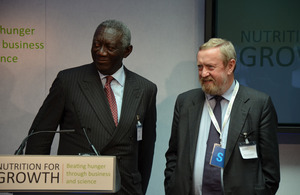DFID Research: UK launches global panel to fight hunger
On 8 June the UK government launched the Global Panel on Agriculture and Food Systems for Nutrition

Co-Chairs of the Global Panel, John Kufuor, former President of Ghana and Prof. Sir John Beddington, former UK Chief Scientific Adviser, at the Nutrition For Growth Event on 8 June. Picture: Alina Paul-Bossuet/ ICRISAT
The Global Panel on Agriculture and Food Systems for Nutrition was launched at the ‘Nutrition for Growth: Beating Hunger through Business and Science’ event on the 8th June. This global event was co-hosted by the UK government, the Children’s Investment Fund Foundation (CIFF), and the government of Brazil to bring together business leaders, scientists, governments and civil society to make the political and financial commitments needed to prevent undernutrition, enabling people and nations to prosper. The event followed on from the UK-Brazil Hunger Summit held in London last summer, which highlighted the devastating consequences of undernutrition on children.
The Panel will be chaired by Prof. Sir John Beddington, former UK Chief Scientific Adviser, and John Kufuor, former President of Ghana, and hosted by the London International Development Centre (LIDC). It will review research evidence and provide global leadership for investments and policies in agriculture that supports nutrition and helps eradicate hunger.
165 million children alive today will have their future potential stunted due to lack of adequate food. Providing better nutrition to mothers and infants in the first 1,000 days is essential to give these children a better start in life. The benefits of interventions that directly tackle nutrition are well documented, but broader measures are urgently needed to address the global burden of undernutrition and under-five mortality.
John Kufuor, former President of Ghana, who co-chairs the Panel, said:
We need a concerted global effort to eradicate hunger and we need it now. No child should have its potential wasted due to lack of food.
Agriculture is critical for improving livelihoods and tackling food and nutrition security. It plays a key role in producing nutritious foods and making them available to consumers through the food value chain, resulting in better nutritional outcomes. It is also an important source of income for farmers and farm workers enabling them to provide their families with better quality nutrition.
Prof. Sir John Beddington, former UK Chief Scientific Adviser, co-chair of the Panel, said:
There is a complex interaction between agriculture, food systems and human health which we do not understand well. Clearly research is needed, but such research needs to be clearly focused to ensure that its results are beneficial and transparent in its implications for policy.
To gather and examine existing and emerging evidence on agriculture for improved nutrition, the UK Department for International Development (DFID) has launched the Global Panel, an independent group of influential experts who will gather and examine the evidence, and provide leadership to the international community in developing global and country-level policies to tackle hunger and undernutrition.
The Global Panel will be supported by a Secretariat led by Prof Jeff Waage of the London International Development Centre (LIDC), a consortium of five Bloomsbury Colleges of the University of London, who will provide expert advice to the Panel and host its Secretariat.
LIDC facilitates interdisciplinary research and training to tackle complex problems in international development by bringing together social and natural scientists from across the University of London’s Bloomsbury Colleges: Birkbeck, Institute of Education, London School of Hygiene & Tropical Medicine, Royal Veterinary College, and the School of Oriental and African Studies. LIDC hosts the [Leverhulme Centre for Integrative Research on Agriculture and Health] (LCIRAH), supported by the Leverhulme Trust to develop a unifying approach and methodology for understanding the relationships between agricultural production and population health, and the factors which drive them both.